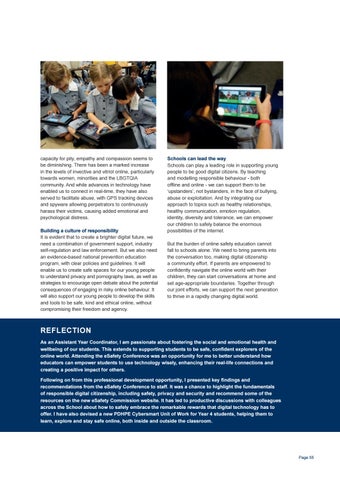capacity for pity, empathy and compassion seems to be diminishing. There has been a marked increase in the levels of invective and vitriol online, particularly towards women, minorities and the LBGTQIA community. And while advances in technology have enabled us to connect in real-time, they have also served to facilitate abuse, with GPS tracking devices and spyware allowing perpetrators to continuously harass their victims, causing added emotional and psychological distress. Building a culture of responsibility It is evident that to create a brighter digital future, we need a combination of government support, industry self-regulation and law enforcement. But we also need an evidence-based national prevention education program, with clear policies and guidelines. It will enable us to create safe spaces for our young people to understand privacy and pornography laws, as well as strategies to encourage open debate about the potential consequences of engaging in risky online behaviour. It will also support our young people to develop the skills and tools to be safe, kind and ethical online, without compromising their freedom and agency.
Schools can lead the way Schools can play a leading role in supporting young people to be good digital citizens. By teaching and modelling responsible behaviour - both offline and online - we can support them to be ‘upstanders’, not bystanders, in the face of bullying, abuse or exploitation. And by integrating our approach to topics such as healthy relationships, healthy communication, emotion regulation, identity, diversity and tolerance, we can empower our children to safely balance the enormous possibilities of the internet. But the burden of online safety education cannot fall to schools alone. We need to bring parents into the conversation too, making digital citizenship a community effort. If parents are empowered to confidently navigate the online world with their children, they can start conversations at home and set age-appropriate boundaries. Together through our joint efforts, we can support the next generation to thrive in a rapidly changing digital world.
REFLECTION As an Assistant Year Coordinator, I am passionate about fostering the social and emotional health and wellbeing of our students. This extends to supporting students to be safe, confident explorers of the online world. Attending the eSafety Conference was an opportunity for me to better understand how educators can empower students to use technology wisely, enhancing their real-life connections and creating a positive impact for others. Following on from this professional development opportunity, I presented key findings and recommendations from the eSafety Conference to staff. It was a chance to highlight the fundamentals of responsible digital citizenship, including safety, privacy and security and recommend some of the resources on the new eSafety Commission website. It has led to productive discussions with colleagues across the School about how to safely embrace the remarkable rewards that digital technology has to offer. I have also devised a new PDHPE Cybersmart Unit of Work for Year 4 students, helping them to learn, explore and stay safe online, both inside and outside the classroom.
Page 55






